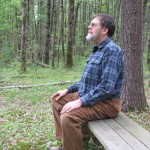Spiritual Identity and Membership Series:
Part 1: Quakerpagan or Paganquaker –
Part 2: Membership and Identity –
Part 3: Marshall Massey Replies
This week, I encountered an update to the link to this blog that Quaker blogger Marshall Massey posted recently. To begin with, let me say that I’m really honored to be listed under Kindred Souls at Earthwitness*. Beyond the Earthwitness itself–on its own an important reason to respect Marshall–I’ve noticed that he not only links to, but praises writers he has had important disagreements with. He is truly open to new perspectives, at the same time that he is rooted firmly in his own very traditional, very Christian Quakerism.
So. I take this guy seriously. And I like that he’s linked to us here. And he says nice things.
Recently I revisited his page, and noticed that the blurb linking to this blog had been revised, partly to point to our post Waging Peace in All Things, discussing the ways Quakers are laboring with the FUM personnel policy. I read something in that update to our blurb there that made me unhappy. Not a put-down–indeed, it’s worded within a complement: Marshall writes that “the impression [he gets] is that [our] first loyalty remains to [P]aganism — but [our] entries on Quakerism are often quite refreshing.”
Refreshing is good. I like refreshing!
But the perception that my first loyalty is to Paganism… that feels bad, like a toothache. Hm…
Let’s try it the other way around then, shall we? “My first loyalty is to Quakers.”
No. That feels sad and cold too. Both phrasings chill me and leave me feeling empty and sad.
I do have a fear of finding myself cast out of both groups. And though I’m entirely sure there are both Quakers and Pagans who would see that as only reasonable, I’ve encountered very few of them. Still–the idea pains me. Why?
Well, to begin with, there’s the matter of the cool kids’ table–of wanting the sense of having arrived that comes with being “in” with a group you admire. I’d be lying if I said that wasn’t a factor in my feelings here. And it’s not much of a motivator for identifying with a spiritual community, frankly.
In a recent post on The Good Raised Up, Liz Opp writes about the distinction between membership and identity with a spiritual community. And though my own understanding of the vocabulary (and maybe the concepts themselves) is different from hers, the distinction she makes is important. She writes:
I think of one’s membership as one’s participation in a group to which she or he has chosen to belong; and I think of identity as one’s self-concept or self-identification in relation to a group that reflects that person’s own self-understanding.
Now, my impression is that most Pagan groups–certainly most Wiccan covens–are looking for a strong combination of both active participation in a group and a self-understanding that is rooted in membership within it. Wiccans talk of something called a group wraith, a kind of communal spirit that a working group builds up over time, almost a shared group soul.
And because of the sense that membership in the intimate working group of a coven or grove involves the ability to participate in this communal spirit, one of the questions most high priestesses or priests ask themselves, when considering admitting a new member to a coven or grove, is whether the person is really, in a deep sense, already a member. In years past, it was common to speak of Witches as having been “born Witches,” or having been a member of a coven in a past life–that’s how important the notion of a self rooted in an identification with the group has been.
So it surprised me to find both Liz and, later, Marshall, speaking of this kind of identification with a group slightingly. In a comment on this post, Marshall wrote
…membership in a group gives the group permission to make demands of you, and even make changes in you, whereas self-identification with a tradition leaves the reins of your life in your own hands. Thus membership is communitarian, while identification is individualistic…
…You know, when I hear people claim that they are Quaker because they identify themselves as Quaker, regardless of their lack of formal membership, what distresses me above all else is the fact that they are claiming the power and right to alter what this community that they’re attracted to is by the simple fact of their own presence, while granting the community no answering power and right to alter them. This is a power play on these individuals’ part, even though they don’t see it as such.
So there’s the idea that self-identification is superficial and individualistic, but membership involves investment and give and take.
Pagans, I think, look to bestow membership where identity as a part of a group already exists. Quakers, at least to to judge by Liz and Marshall’s discussion, look to develop identification with a group through the formal relations of membership. It’s probably a chicken and the egg type of issue, really–membership shapes identity shapes membership.
Quakers, as a group, are better at doing spiritual life communally. I’m not saying that Quakers are better at community in general than Pagans are. But because Quaker worship is a corporate–group–communion with God, the willingness to move beyond one’s individual indentity and understandings is built in to the experience in a way it is not among most Pagan groups. It is true that Pagans are indivdualistic, possibly to a fault.
But I’m not convinced that self-identification is rooted in the place of a merely individual self. And I’m not convinced that, even among Quakers, with their careful discernment processes, formal membership is what “gives the group permission to make demands of you, and even make changes in you.”
I’ll agree, though, that only to the extent that there is a level of mutuality and exchange at a level deep enough to shape the soul is one really a part of a spiritual community, Quaker or Pagan. Anything less, and you’ve got a nifty social club, but not a spiritual community, I think.
And here’s where we move past simply a desire to sit at the cool kids’ table–what Marshall would term a power play, perhaps.
To the extent that my spiritual community does not accept my membership, or discounts it as merely individualistic “self-identification”, I will be cut off from exactly what Marshall sees self-identifiers as withholding from their communities: that interdependence, the right not so much to make demands on the group or to shape it to my liking, as to serve the group, offer it my gifts, and be transformed by the experience of that mutuality.
Concrete example:
Peter and I are teachers. A few years back, when I had just become a teacher, I realized that, between us, we’re pretty much competent to teach a whole curriculum. He’s got the math/science thing going on (and more certifications than a charm bracelet has charms), and I’ve got the humanities and social sciences. And the thing about teachers is that the whole world needs ’em. Did you know that there is a school, for instance, for the scientists’ kids in Antarctica? Imagine what it would be like to teach in Antarctica for a year! What an amazing thing that would be.
I bet the Quakers out there already know where I’m going with this…
I’m thinking about that famous FUM project, the Ramallah Friends Schools.
For a brief, brief window in time, when I became a member at Mt. Toby–when I found that being an out Pagan as well as a Quaker in attendance at NEYM this past year did not seem to offend anyone within our dual affilated yearly meeting–it seemed possible, just possible, that one day Peter and I might find ourselves living, learning, and being transformed by teaching in Ramallah. Indeed, one Friend, discussing the idea with us over breakfast, was quite enthusiastic, and spoke of the difficulty there sometimes is in getting enough practicing Quaker teachers for the school.
Until he found out we were Pagan. And then the lights went out. No… that’s not possible.
Watching what is going on worldwide with FUM and its positions on homosexuality, I can see quite clearly that Peter and I would be no more welcome than would an openly gay or lesbian teacher. Less, perhaps.
Is this right? Is this what should be?
Well, that depends on whether or not I’m really a Quaker, doesn’t it? I say I am. Of course, I’m merely an individual. However, Mt. Toby says I am, too–has embraced me and has embraced Peter without reservation, and allowed us to serve and test our Quakerness in the life of the meeting.
But FUM and conservative-leaning Friends would probably say that I am not. (Probably–I admit to making a certain number of assumptions here.) Which is painful, but also not the point. Because it’s not just about the cool kids’ table anymore. It’s about exactly that interdependence that spiritual community is about.
For the record, I’m not saying I’d be over there in Ramallah if matters stood differently–I would not call the flash of excitement and possiblity that I held briefly a leading, and I have made no move to test it. I haven’t even written to anyone in Ramallah or FUM about the possiblity, because it is honestly not that concrete an idea. But the ironic thing is that, at a time when FUM and its dual-affiliated meetings seem to be bracing to tear the Quaker world apart, I’m finding myself more and more invested in building bridges. If I can…
For the record, I’m not pointing a finger at anyone in FUM or at Marshall or Liz Opp or anyone else out there for the fact that accepting as a Quaker a woman who recognizes and worships more than one god is controversial. It ought to be controversial, in fact.
Ass a bottom line, Quakers are unique in the world for the way we worship and the way we conduct business, seeking unity with God (a word I am still abashed to use) and because of the nature of that community with and through God, introducing new thealogies casually would be a mistake. (That’s in contrast with Paganism, which seems almost infinately malleable–though partly, as I said before, at the cost of some degree of communal spiritual experience.)
Only that which does not interfere with the unique Quaker way of being together-in-God should be part of Quaker life. That’s seems clear to me.
But that’s just what keeps me Quaker–we center down, and I can find you, Friend, in the shining place: you and the sea of limitless Light. And that’s what keeps me Pagan–I go out into the woods, and the trees are not things but friends, and the moonlight makes what is sacred shine out all around me.
I can’t prove love. I can’t prove music. I can’t prove I’m Quaker, or Pagan, or anything else I deeply care about: a good parent, a good teacher, a good friend…
But that isn’t the point, really. No matter how the labels fit or don’t fit, my job is to keep walking… just keep walking. Herne on my right hand, Jesus on my left (if the Spirit should so insist!). Just… keep going the way I’m led.
(“But I wanna be in the Quaker club, too, dammit. Why don’t I ever get to sit at the cool kids’ table?” A small voice asks. Shut up, voice. This isn’t about that. Keep walkin’.)
*For what it’s worth, the sole reason Marshall is not listed in our blogroll is that his blogs have a slightly different focus than ours, and I’ve felt a need to trim and focus our blogroll recently, just to keep it manageable. But I truly do recommend both The Earthwitness Journal and The Quaker Magpie.















